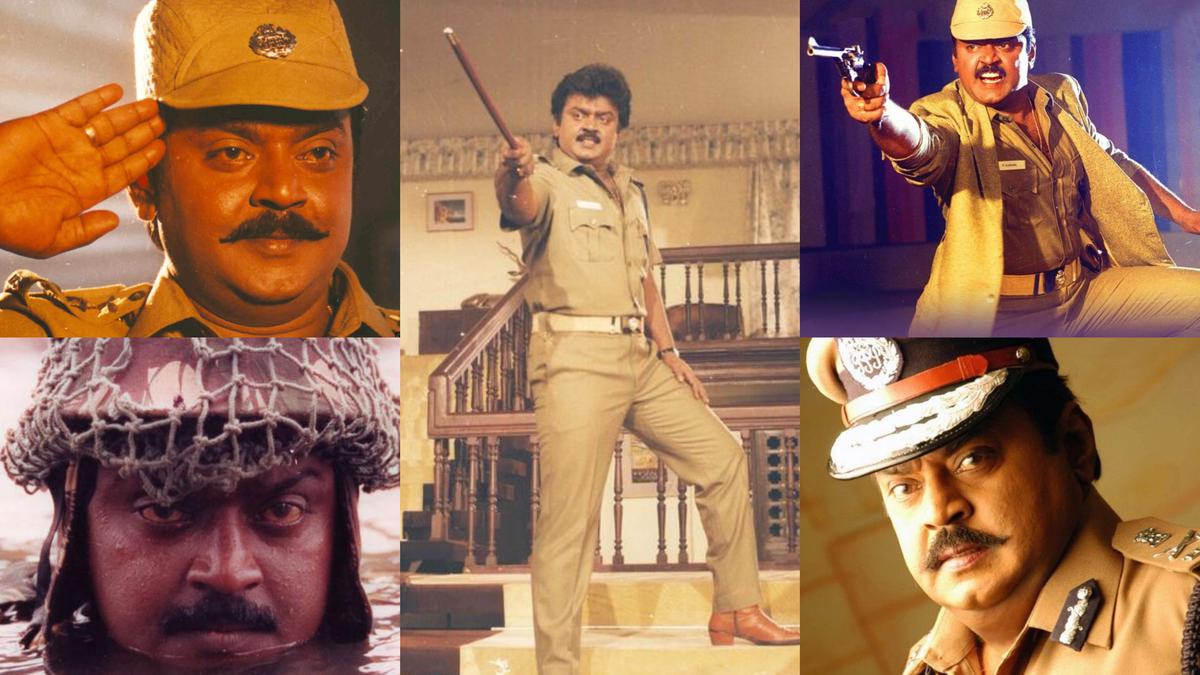
Adios, Captain Vijayakant: The quintessential cop and crusader on-screen
The Hindu
A look at Captain Vijayakanth’s four-decade film career pays tribute to a role he mastered — the man in uniform who fights for justice
It wouldn’t be far-fetched to say that for every other cop you come across in modern-day Tamil cinema, there might be a Vijayakant cop movie that shares some degree of similarity. Widely known for his stellar portrayals of the silver screen man-in-uniform (the star has donned the khaki in over 30 titles), ‘Captain’ personified valour and patriotism in several of his films. On one hand, he had a string of commercial entertainers like January 1 and Chatriyan, and then there were the more niche attempts like Oomai Vizhigal that tasted success.
“Oru kutravaali police aaga mudiyadhu. Aana oru police kutravaali aagaalam.” (A criminal cannot become a cop, but a cop can be a criminal). This is the first of many iconic dialogues of khaki-clad Vijayakant, and this one came in his 1982 Rama Narayanan-directed movie Sivantha Kankal. Batting for the rights of industrial labourers, the film showed him questioning the discouraging attitude against police amongst common folk while also having him face a corrupt system that makes people lose their faith in the police. This has been a recurring theme in many of the films that followed; the stories featured the star hanging up his police boots to take the approach of a vigilante to seek justice. 1983’s Saatchi, Vijayakant’s sixth collaboration with SV Chandrasekhar, was one such film that saw him remove his uniform to free him from its restraints.
Who other than Captain could enter the office of IG as a suspended DCP ‘Honest’ Raj only to call him out as a political puppet? That’s 1990’s Pulan Visaranai for you, in which he takes on a criminal inspired by real-life serial killer Auto Shankar. 1994’s Honest Raj also had him remove the uniform but on a quest for vengeance over the death of his mother and wife. In 1991’s Maanagara Kaaval, despite getting suspended, ACP Subhash goes on a mission to right his wrongs by capturing an elusive gang of criminals who are helped by a mole among the higher ranks of the police.
Revenge and hanging the boots might be a common theme in most of these films, but when Captain decided to rejoin the police force and take the legal route to exact revenge, the result was an explosive blockbuster in the form of Chatriyan (1990), directed by K Subash; that scene involving the star shooting a shield will always be a show-stealer.
Considered popular for championing feminist themes, many of his cop roles had him fight against issues faced by women. The aforementioned Pulan Visaranai, had the star run after a serial killer who abducted and sexually assaulted young women, eventually forcing them into prositution
Puthiya Theerpu, a much earlier attempt in 1985, took on the issue of forced sex work directly. The film batted for the rehabilitation of the victims and stood against the harmful notions that work against them in society. His last film as a leading man, 2010’s Virudhagiri, the only film he directed, might have been a debacle but that he wrote a story against human traffickers who prey upon transwomen and women showed that ‘Puratchi Kalaignar’ has indeed stood tall in his views on gender and gender politics.
Vijayakant playing a cop to save the nation from terrorism or a serial threat is a favourite sub-genre for many fans. His 100th film, 1991’s Captain Prabhakaran which earned him the beloved moniker of ‘Captain’, had him fight a nefarious forest brigand (said to be inspired by the infamous Veerappan) and corrupt politicians who aided the criminal for their own benefit.





















 Run 3 Space | Play Space Running Game
Run 3 Space | Play Space Running Game Traffic Jam 3D | Online Racing Game
Traffic Jam 3D | Online Racing Game Duck Hunt | Play Old Classic Game
Duck Hunt | Play Old Classic Game











